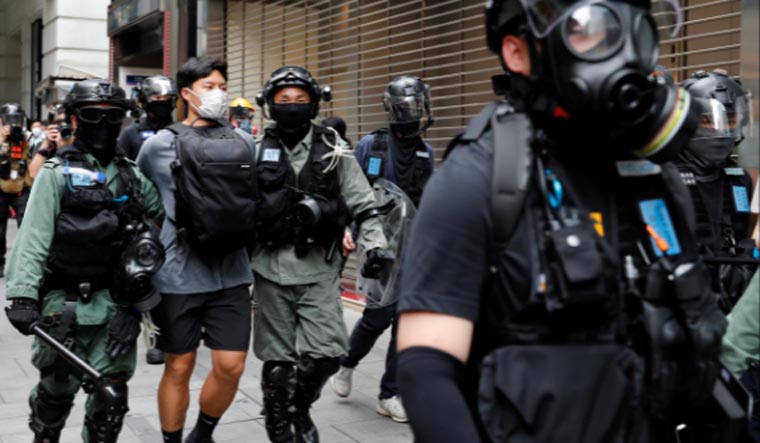China's parliament on Thursday approved a new controversial security law for Hong Kong that would make it a crime to undermine Beijing's authority in the former British territory.
China's annual political season, delayed by the COVID-19 pandemic, ended on Thursday with its legislature, much on the expected lines, endorsing the new security law for Hong Kong.
With the new law, Chinese security agencies can for the first time open their establishment and operate in Hong Kong.
The National People's Congress (NPC), which ended its week-long meeting, approved a host of bills on the last day, including the new security law for Hong Kong, state-run Xinhua news agency reported.
The bill now passes to the Standing Committee of the Communist Party and could become law by August.
The full details of the bill are not yet known.
The authorities in Hong Kong insist the law is essential to tackle growing violence and "terrorism", and that the territory's residents have nothing to fear from it.
Critics fear it could lead to Hong Kongers being prosecuted for criticising their leaders or the leadership in Beijing, joining protests or exercising their current rights under local laws.
China's move has already sparked a new wave of anti-mainland protests in Hong Kong, a former British colony, which was handed over to Beijing on July 1, 1997.
Clashes broke out again on Wednesday, as Hong Kong's parliament debated a different proposed law, which would make it a crime to disrespect the Chinese national anthem.
The NPC—regarded as the rubber stamp parliament for its routine approval of proposals of the ruling Communist Party of China (CPC)—unanimously approved the law, which Hong Kong political parties said would be a death knell to its 'one country, two systems' and the autonomy it enjoyed from China.
The law has been denounced by the US, the UK and the EU as being a blow to freedom and liberty of Hong Kongers and affecting the city's status as an international business hub.
US President Donald Trump is "displeased" with China's new national security law for Hong Kong, the White House has said amid rising tensions between Washington and Beijing in the wake of the coronavirus pandemic.
"He (Trump) is displeased with China's efforts and that it's hard to see how Hong Kong can remain a financial hub if China takes over," White House Press Secretary Kayleigh McEnany said on Tuesday.
US Secretary of State Mike Pompeo said Washington no longer considered Hong Kong to have significant autonomy under Chinese rule, a move that may end some or all of the US government's special trade and economic relations with the territory in southern China.
Pompeo has said the security law would be a death knell for Hong Kong, which has had liberties under a semi-autonomous system of governance that do not exist in mainland China, including freedoms of speech, the press and assembly, as well as an independent judiciary.
Observers say the new law cast a shadow over the future of Hong Kong, which was regarded as a centre of global capitalism and symbol of resistance to the Chinese Communist Party.
The contours of the full legislation would be finalised by the NPC session in the next few weeks.
Earlier, the Hong Kong Bar Association said China has no legal authority to enact its national security law for the former British colony.
In a strongly worded statement, the association also expressed concern over suggestions that mainland security agencies would be set up to safeguard national security within the city, saying it was entirely unclear how that arrangement would comply with Article 22 of the Basic Law, which stipulates Beijing departments not to interfere in local affairs.



